Stories
If you can't see the pictures around this frame: click here
| Respond to this site!
|
Stories

|
Morocco
Story of sergeant Ben Daoud about Kapelle
The Netherlands
Truus Menger, friend of Hannie Schaft
The Netherlands Antilles
Abigaël Santcroos and Thelma Polak in the 'Apeldoorn Forest'
The Netherlands Indies / Indonesia
Han Bawits and WW II
Ronald Scholte on Nagasaki
Java
Camp notes by prof. dr. I.J. Brugmans
Memories by Friar Angelus
Moluccas
Experiences in the war by Max Tauran
Witness Jacob Litamahuputty
Surinam
Witness Theophilia D'Hondt-Berkenveld
Turkey
Haci Karacaer: 'We have to share the stories from our past'
More reading
Morocco
The story of sergeant Ben Daoud about Kapelle
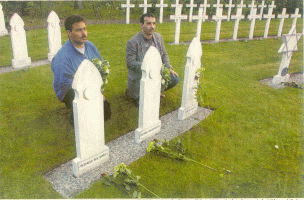
Members of the Moroccan community at the graves of Messaoud ben Ahmed, Mohamed ben Abdesselem and Ahmed ben Laski in Kapelle. Picture: NRC, Evelyne Jacq.
In 1938 Moughit Ben Daoud and together with him thousands of fellow countrymen received a short military training in Taza, northern Morocco. He became a sergeant and was given the leadership over 34 soldiers.
After six months he left with his unit for France, where they stayed in Lyon for two months.
After the invasion in Austria in 1938 France stationed a large army force at Dunkirk. This force consisted of 30,000 Moroccans. At Dunkirk they were quartered in the line of fire to stop the advance of the Germans towards Belgium and France. Partly because they were 'too lightly armed' they were surprised by the strong German military. Dunkirk was bombed from the sky. Then the Germans caused with their tanks a real slaughter. Also in many villages fights went on from man to man, also - as a late defence of the Schelde – in Kapelle in Zeeland. The French generals gave the military only one command: 'Don't loose your life.'
Twelve people in Ben Daoud's unit died in the battle at Kapelle.
Eight soldiers from his unit were taken prisoner of war. The local community still keeps fond memories of them.
Fourteen soldiers survived the slaughter. They fled, in their underware, because a uniform was too dangerous, along the Schelde. At some point they swam for miles through the Schelde, until the eventually were picked up from the water by a Dutchman. He brought them to his home and offered them dry clothes and shelter.
Ben Daoud doesn't remember where this was. After three days of unforgettable hospitality from this Dutchman Ben Daoud returned with the rest of his unit to Belgium. From Belgium they managed to get to France.
The Netherlands
Truus Menger, friend of Hannie Schaft
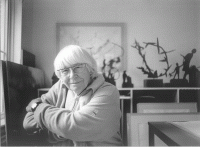
Picture: private collection Truus Menger
What shall I tell about myself? I was born in 1923 in Haarlem, Freddie Oversteegen is my sister. I've got four children and also four grandchildren. Hannie, my eldest daughter, is named after Hannie Schaft. Nowadays I live in Grootebroek and work as a sculpturer.
I've founded a children's home in Soweto opgericht (Bambisanani) voor mentally and fysically disabled children. Those people there are so poor, we really have to help.
Many people call me brave, sprightly and militant. Well, that is correct. If something isn't good, I go for it. It doesn't take me long to decide. When they ask me why did you do it, how did you dare, I often say "because".
That's also the way I joined the resistance in 1940. In a group with Freddie, Jan Bonekamp and later Hannie Schaft. "You're not rude if you dont't take it ." Sometimes we were scared to death in an attack or when blowing up a bridge. Sometimes also happy and greatful for instance when we were able to save refugees and children. Sometimes also angry when we saw terrible things. I was truly desperate when Hannie was made prisoner just before the end of the war and I couldn't free her. They killed her.
People haven't always been nice to me, because I was a communist. Sometimes it makes me bitter. But I've always stayed an idealist, despite everything.
At home we were poor, at school I liked to make drawing and I did pretty well, but there was no money for the academie of art. During the war I went underground at Mari Andriessen. He made the famous statue of the dockworker in the February strike in Amsterdam. From him I learned a lot, also later on. Much of my work is about the war. I try to show in my sculptures pride and inner strength. I also designed the Children's Monument in Amsterdam. "Playing together - Living together" I put on it.
I like to go to schools to talk to young people, to tell them what the war was like and how we felt, to explain that you're not rude if you don't take injustice. If I were 16 now, I would join Greenpeace or Amnesty International.
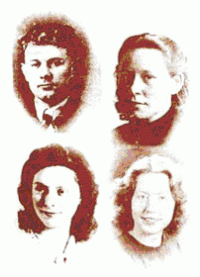
Picture: www.kindermonument.nl
I wrote a book 'Not then - Not now - Never'. I dedicated it to my sister Freddie. It's also about us. About our youth when my mother and therefore also us helped refugees from Germany, about my first jobs. But most of all it's about how we joined the resistance (spreading pamflets from illegal newspapers like de Vonk and de Waarheid, the appeals for the February strike), how we helped people underground and how we joined the resistance group of Jan Bonekamp. In 1943 I had to bring underground jewish children to a save address, which was a terribly difficult task. Later Hannie Schaft joined our group, whom we didn't trust at first. In my book I wrote about our work in the resistance and also about how we felt.
Much has been written about Hannie. "Why? Because!" The most famous must be "The girl with the red hair" of Teun de Vries; also a film was made about it. I'm still with the Hannie Schaft Foundation, my daughter Hannie is chairman. Every year, on the last sunday of November, we commemorate Hannie Schaft in Haarlem. She was reburied on 27 November 1945.
The Netherlands Antilles
'The Apeldoorn Forest'
Abigaël Santcroos was born in Curaçao in 1865. Her last known address was the Central Israelite Mental Home ‘Het Apeldoornse Bos’. From the site of the Jewish Monument: ‘In the night from 21 to 22 januari 1943 the Apeldoornse Bos was 'cleared'. The name of mrs. Santcroos is number 33 on a list with over 1,000 patients and other victims of the Sjoa. She belonged to the eldest inhabitants. The Surinam raised Thelma Polak (1920) but born on the island of Saba, is also on the list of ‘Het Apeldoornse Bos’. She might have been a nurse.
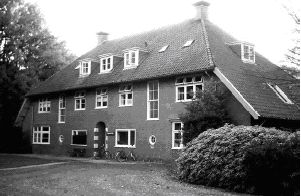
Picture: www.sheerenloo.nl - Spectrum 2005
Mrs. Santcroos was gassed three days after the eviction in Polish Auschwitz, Thelma six weeks later in Sobibor. Dr. Presser summarizes in his book 'The downfall' the stories about the eviction from the institute.
Through Zõpf from Berlin Harster received the decisive order for the eviction from Eichmann, who sent a train with 25 wagons to take the patients away. …. On 19 Januari, Wielek states, the Apeldoorn commissioner of police, in talks with inhabitants and the medical superintendent, declared the total institute would be 'freed of jews'.…
But from more than one document from that time can be derived, there also were persons in the institute, who must have gone there underground … which is almost sure for a number of trainee-nurses; and also a few other people who went underground. Buth many of the healthy went together with the sick and shared their fate…
Already when loading the trucks, thing completely got out of hand. Often beatings and kicks were used to get the people into the trucks, children no exception. Quite a few were harly dressed. ‘I've seen patients, mostly old women, were put on matrasses in a truck with the next human load on top’, according to an eyewitness…
The next morning, very early, Aus der Fünten asked for volunteers from the nursing staff, to join the train. About 20 stepped foreward, he indicated 30 more; they went in a seperate wagon, hooked on to the others. They had been given the assurance they would come back afterwards, or become a volunteer in a modern hospital. None of them survived. Neither did the patients…
The Netherlands Indies / Indonesia
Han Bawits and WW II
On 25 May 2004 the Haarlem Migrants Platform and Multiple Choice organised an evening about '60 Years liberation for everyone'. Han Bawits was there as a private person and not on behalf of an organisation or platform. He told how ambiguous the Second World War is to him. It was a double war.

Picture: Pim Ligtvoet
His grandfather was a cook in the Dutch colonial army (KNIL) and was made prisoner of war. He was transported to Japan and ended up in Nagasaki. There he died because of the American atom bomb of August 9, 1945.
As a child he attended an Indonesian school after 1945. There he learned the most important holiday: August 17. On this day, in 1945, the nationalist Soekarno declared independence from the Netherlands.
But at home he learned August 15 was the most important day. Because on that day Japan capitulated, under pressure of the atom bombs on Hiroshima and Nagasaki. The Indian Dutch suffered terribly under the Japanese occupation and felt themselves liberated. The Indonesian nationalism was connected to the Bersiap-period (Sept.-Dec. 1945), during which time radical nationalists played havoc among the Indonesian Dutch and other groups considered as conspicious.
Eventually this lead to most Dutch in Indonesia to 'repatriate' during 1950-1960 ’to the 'motherland', about 250,000. The first and second generation add up to about 500,000 persons (CBS 2001). The CBS (Central Bureau for Statistics) doesn't consider the third generation as a special group.
Han Bawits specifically underlined to celebrate Liberation and People's Rights nowadays. You have to start from the individuel Human Rights, which were, because of the terrors from the years 1939-1945, written down by the United Nations. On this also article 1 of the Dutch Constitution is based.
Ronald Scholte on Nagasaki
Before the war Ronald Scholte (1924) was in engineer at Shell. During the occupation he was made prisoner of war and deported to a camp in Nagasaki, Japan (also see Han Bawits). The group was welcomed by a hail of stones. Scholte witnessed the attack with the atom bomb on August 9, 1945. In 2008 he told his story to Samira Ahli of the Volkskrant (8 October 2008 - Dutch newspaper).
August 1945
Together with other prisoners we were digging an air-raid shelter in the hills just outside Nagasaki. We heard the roaring engine of a plane above us. Instinctively I stepped back, into the tunnel we just dug. Outside someone shouted: a parachute! I saw a flash and was thrown with force into the tunnel. That was my luck. We were 1.800 meter away from the spot were the bomb fell. People who had stayed outside had burns. Below, the town was ablaze.
After the war
After Japan capitulated the Americans brought us, prisoners of war, to the island of Okinawa. From there I returned to Java. Meanwhile a revolt was going on there, so I immediately joined the service. In 1948 I had enough. I returned to Holland in 1950. The return was miserable. My wife was suffering from tuberculosis. I started working as an engineer with the army, but had to make my way up all over again. From an enjoyable salary at Shell, I now started with 52 guilders a week. But it all turned out well. And I never had a sleepless night. That is quite different from a lot of fellow-suffers I knew.
Compensation
By a change in legislation this June, also foreigners can be recognized as survivers of the atom bombs (hibakusha's). Ronald Scholte: In September a Japanese journalist asked me to submit a form. So I did. I'm not interested in the money, but always felt recognition is important.
No resentment
In 1998 I returned on an invitation by the government and I was welcomed as a hero. The Japanese did quite a lot to influence the public opinion about their country. But many survivers from the camps can't stand anything or anyone from Japan. I've seen so many victims in Nagasaki, who were just as innocent as we were. I feel no resentment.
Source: De Volkskrant, 8 October 2008
Camp notes prof. dr. I.J. Brugmans
Ieb Brugmans was born in 1896 in Groningen. He studied history and social sciences in Amsterdam and promoted in 1925 cum laude on ‘The working class in The Netherlands in the nineteenth century’. Meanwhile Ieb Brugmans was married to Louise Irene Martens; the couple had three daughters. From 1929 he worked in the Netherlands-Indies at the Ministery of Education and Worship. In 1934 his family returned to Holland. They joined him again in 1940. Professor Brugmans then was rector magnificus of the just by him established Literary Faculty in Batavia. On 10 May 1940 The Netherlands were occupied by German troups. On the first of March 1942 the Netherlands-Indies fate was sealed by the Japanese. At that moment the Brugmans family was in Bandoeng, 150 km south of Batavia.
On 13 October 1942 during the night professor Brugmans was run in and transported to a internment camp in Bandoeng, the former Dutch-Chinese Primary School and Fröbel school ‘Maria Sterre der Zee’. From there he can see the hills which can also be seen by his wife and children. At first he receives parcels from them. After about a year his group with many high-educated civilians is moved to camp Tjimahi, department Baros Njontrol, where he will stay until 21 October 1945. His wife Loes and their three daughters Gerda, Adèle and Irene are also interned at the end of 1942, in Tjihapit, Bandoeng. In 1945 they are sent to the woman's barracks camp ADEK in Batavia, where they are liberated. At his liberation, the 1.88 m. tall Brugmans only weighs 47 kilo's. After a period of revalidation the family returns to Holland in 1947. In 1948 Brugmans is appointed professor of Economic History to the University of Amsterdam.
At the end of June 1950 he hands over the corrected and, by his daughter, typed camp notes (in pencil on all kinds of pieces of paper) to the Rijks Archive on War Documentation. In 1966 he retired. Ten years after his death in 1992 the notes are ‘disovered’. In 2004 they are published.
Professor Brugmans made his forbidden notes usually several times a week, but sometimes not for days or weeks. At the end of the period in the camp he feels more free and writes on a daily basis. He encourages himself by remembering and honour ‘holidays’: the wedding day, de birthdays from his wife and daughters, the birthdays from members of the Royal Family. Also hope is taken from the advancing allies in Europe and Asia. It seems he never knew about the atom bombs on Japan.
But most of all he picks up his profession again: lecturing, teaching, organizing exams secondary school and up. Usually it is ignored by the guards. Making notes becomes more rich. From July 1944 he writes ‘monthly overviews’, as positive as possible, writes down some official Japanese announcements, and every now and then shares his feelings with his wife. He describes notorious ill-treatments of fellow-prisoners.
His greatest problem seems to be malnourishment and illness. Between April 4 and June 24, 1944, he's in the hospital barrack for almost three months. Between November 28 and December 13 again, and also between April 23 and May 14, 1945. In May/June he suffers from influenza three times. Then for the first times he writes about ‘feeling down-hearted’. He called that period the final stage.
From early August there are rumours about a cease-fire, on 14 August about the ‘last convulsions’. On 22 August 1945 the Japanese authorities declare to the people in the camp the war is over.
13 October 1942: Bandoeng
"03.45 hours run in from home by a truck. To the theatre (Pieterspark). From there in columd marched down to Waringinlane. Tikar [reet sleeping mat] handed out, nothing else. …. Very little clothing, many pyjamas. Nearly onlo Indo-European (some speak Maleisian).
31 July 1943
No more newspapers. Wednesday 21 the last one. It seems this isn't only limited to our camp: messages from the hospital tell the same. Thus now we only know by rumour how the expedition on Sicily is working out. It's teribble, but overall this measure feeds our optimism, because we say: we're not allowed anymore to know about the allied advancements. We also think it's related to the fact, that on sunday the 18th an interned prisoner is taken away by the Kempetaid, because he told a policeman: in three months America is here. The man must have been terribly ill-treated without interrogation [....]
Since last week I'm attending Italian classes from De Ferrante. Also new circles are erected: one for international issues under the leadership of Mr. A. (where I will speak about the Peoples Union), and one on sociale issues, especially ethnic groups within the Indies, under the leadership of V. Soon I'll give a lecture there too.
Also busy talks about H.B.S. and Mulo [two types of secondary schools], which we will start. [....]
4 December 1943: Tjimahi
Holiday! [birthday Loes] I was a lot in Bengawanlane 11 [camp Loes and daughters]. When do we see each other again? Here it was a full, well spent day. In the morning Youth Council (does a lot of good work), after that for the first time reading Tacitus gelezen with Sandkuyl and Lamsvelt. In the afternoon talks about starting a Agricultural Course. With the leader to be. In the evening a performance of 'E. and R.’ [Education and Recreation?] Smoked my last good cigar. Received it 3 March. [last parcel from Loes]
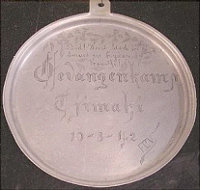
Plate engraved by a prisoner with the initials FCV. Japanese Camp Tjimahi. 10 August 1942
23 January 1944
for the first time a little bit of rice since the end of December. The entire camp is brimming about it and for days spoke of nothing but the rations to distribute, the number of rice-days etc.. The food seems to be improving now, so I'm off the list of people getting extra portians. This all contributes, as much as the better news from outside, to a much lifted mood. Immediately rumours: ‘Germany collapsed’. They'll never learn.
6 March 1944
Yesterday evening 11.30 – everyone in bed – suddenly roll-call: everyone to line up at the field, in the new number order (I'm 377). It seems we're about to have a speach from Araki, our new chief. Mister Rynders Folmer translates. Three interned have escaped from one of the Tjimahi barracks, telling they were hungry. In an absurd long speech, during which the speaker also repeats himself, he tries to warn us fleeing means suidice and … that he'll do anything possible concerning the food. This all is a typical example of Japanese psychology and proves the man is afraid: the refugees will be put on a field for hours and for all to see, despite rain and sunshine … they'll probably be executed … who wants to flee first had to report to him, Araki … who is so hungry, that he can't take it anymore, step foreward … etc. And ofcourse all this we have to know before dawn! The translater is brief; only one or two sentences after minutes of declaiming by the Japanese.
21 June 1944
Received definite circumstances (directly) about the punishments for the writers of the notes, who now have returned to the camp [messages were exchanged with another section of the camp]. (A large number of new culprits is punished, according to the announcement board, to fourteen or twenty-one days of cell). The punishment itself isn't incorrect, but there are serious objections to be made against the treatment by the military police, who are electrocuting people with plugs in their ear and nose. Perhaps more serious is the treatment in prison. Every moment a Jap can take them out and whip them or beat them up. It also happened, drunk Japanese opened the cell doors and beated up the detained (also kicking to the chest) for fun. [....]
24 June 1944
Return in the barrack after eight days of illness. I'm not too bad. There seems to be not enough room for me, because some chaps refuse to even given in a few centimeters. A temporary solution is found, by taking the space from a patient. […] When leaving the hospital I was given some details by the nurse about the ill-treatmentr of the punished note writers. With eighteen they're in a dark room of four by four meters, with bare walls and a tiled floor. Nothing is in it, literally nothing. Bed, matrasses, blankets etc. are absent. The prisoners walk on bare feet; shoes and socks have been taken from them. Many of them show signs of ill-treatment. […] All have been whipped; but they, who were considered the ringleaders were so beaten up, they dropped down unconscious. There's also a favourite position: placed with the back to the wall and given punches to the jaw; my spokesman heard from his cell the back of their heads hitting the wall every time they were beaten. Food had been acceptable, but there were only a few plates and spoons; usually they ate with their hands.
31 Januari 1945
Celebrated Beatrixes birthday with, for us, a royal meal: coffee in the morning, extra rice, extra bean soup, and stewed carrots. The month January provided better food (always number 1!), but we actually pay for it ourselves: 15 cents for beansoup, twice per week 22 cents for oebi [red second grade potato] and part of the vegetables are provided by our own garden service! […]
Our books are still confiscated; but some of the religious books have been returned (stamped), so secretly reading now is less dangerous than before.
The condition of health – not too bad – is still deteriorating considering the growing number of patients. Except for bacterial dysentry much of the diseases are caused by wounds, that don't heal normally, but develop into tropical ulcers, rashes etc. This is the result of malnourishment, just as the many people in the camp with ‘camp legs’ (swollen or by contusions affected legs).
The money for the clothes which were ordered to hand over, has been given back, that is: written down in everyone's toko [little shop] account. […]
10 July 1945
Tonight I dreamt, how I cried a little on your shoulder, Loeie, saying: ‘Sometimes it's so hard to stay strong’. That's the common spirit here: despite the roaring messages we're a bit depressed. The final stage! […]
21 September 1945
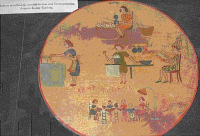
[…] Arranged return: only with a note from the Red Cross I could get a train ticket. Red Cross letters to Holland: one to Eul [cousin], one to my family in Groningen. Goodbye to Adek [women's camp Batavia], Ger and Dèle take me to the little station Pegangsaän, where I find out leaving the camp has become very easy. On Pengsaän Soekarno lives in the old house of Van Asbeck, later Feith. […]
Because of the failed visit ton Tjideng I wasn't able to personally witness the Tjideng scandal – that's what it's called already. What I heard from trusted people is already bad enought. In little houses, build for middle-class family's with 2 or 3 children, sometimes 40 or 50 women were placed. […] The women were forced to cook most of the food themselves; because they didn't receive enough wood to do so, they were forced to take the woodwork (doors, window frames etc.) out of the houses.
And finally: the treatment by the leading Jap was outrageous: women kicked and beaten up for peanuts and especially: hunger punishments. One day, when because some sort offence of no food was given, the [leading Jap] had the bread toured around the camp, to bury it afterwards in a pit. […] How our Reen [Irene] in Tjihapit was beaten up, smashed against the floor, pulled up and smashed again, and only for an offence (so-called not greeting), can't be justified by any reason or even fallacy.
Also needs to be stated that the Kempei [military police] in Batavia already imported Java time; the railways still were on Nippon time.
21 October 1945
Sunday. A truck with British-Indians appears at the gate. After some recon they leave again! On my own I walk through the gate, along the railway track. Everything is quiet on this sunday morning. When I return, the Japanese at the gate have been swapped with British-Indians. Just a few Japs are left. Thus my Japanese internment ended quiet and soundless."
Memories by Friar Angelus

Picture: Marja Eijkhoudt
When the war broke out, I was in Bandjarmasin. That is on South-Borneo (Kalimantan). On 10 February 1943 the Japanese approached Bandjarmasin. First we (friars and many other Dutch) wanted to flee inland, but when we were ready to leave, they already were in town. Then we tried to cross over to Java in an overloaded boat. After an adventourous trip of six days, our boat had drifted off to Madura (island north-east of Java). A Dutch patrol vessel picked us up and took us to Surabaya (north-east of Java). There we were taken care of by the Friars of Oudenbosch.
We were kept fairly undisturbed for about half a year, but on 28 August 1943 we were violently run in. Because the Japanese believed us to be disguised military, the arrested friars and priests were ill-treated: beaten with sticks and thrown onto the concrete floor with a judo hold.
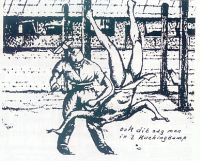
Drawing: Friars of Huijbergen
After this we were kept for half a year in a prison in Kediri: twelve of us in a cell of 10 by 10 feet.
Early 1944, thin and bearded, we were transported without food or water in blinded train to a camp in Tjimahi (near Bandung, west Java), together with the ex 4th and 9th batallion (see notes prof.dr. Brugmans).
As far as I know there weren't any native friars or sisters in the camp. I do remember a native father who wasn't taken in and was able to do a lot of good work during the war. Our group consisted of 9 friars, but we were told there were as much as 10,000 persons in the camp. Ofcourse the camp wasn't only for clergy and so on, but they did form seperate groups.
In the beginning in the camp we were often beaten up and were hit with a stick in our faces and on our backs. Many times our prior underwent the notorious water test to make him say the friars from Bandjamarsin were military, but he never did.
Food wasn't much: in the morning cooked corn with a little peace of tempé and than two times al little bit of rice with corn and a little peace of tempé and on sunday a small peace of meat.
Compared to other camps on Java we weren't that bad off. We even sometimes laughed. We could attend mass and also worked as a nurse in the camp hospital.
Daily life in the camp consisted of chores in the garden or making knapsacks and doing other jobs.
Meanwhile also time was spent on culture and recreation. The Hungarian Ensemble, whose members all were in the camp, often gave concerts. These were real musicians like: Simon Goldberg, Setet, Dan Coletz, a.o. But also our church choir was fine. It was lead by friar Aurelius (of Utrecht) and performed beautiful works for choir and orchestra. (ed.: Goldberg was a member of the Lilie Kraus Simon Goldberg Duo. Two 78-revs recordings are known for the Mozart Chamber Music Society. Also in 1932 a sinfonia concertante by the Berliner Philharmoniker with Goldberg as a violinist was broadcasted. Probably never a recording was made from this. There's nothing known about the other two mentioned.)
Officially nothing was mentioned about the liberation. We heard about it from people working in the kitchen, were a radio was hidden under a bench usually a guard was sitting on. Chores were lifted on 15 August 1945 and our food improved a little. After that I went to Perth (West-Australia) to regain strength (4 months). After that time I returned to Bandjarmasin.
Friar Claudius Sommen didn't survive the hardships of camp Tjimahi: on 31 Augustus 1946 he died in a hospital in Batavia of the aftermath of the dysentery he catched in the camp. Friar Ireneus van de Avoird always had a difficult time after his experiences in camp Tjimahi because he brought degrading treatments upon himself, as he always stood out to defend the other friars in his group.
Friar Angelus of the Broeders van Huijbergen (Antonius Fr. Van der Zanden, 23-10-1912)
Experiences in the war by Max Tauran
His experiences in the war on Ceram made Max Tauran (1932) an adult before he was thirteen years old. He's an active Moluccan. To him remembrance involves mixed feelings. His entire life he stood between the parties.
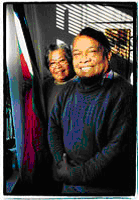
Max and Thabita Tauran (Picture: www.oorlogsgetuigen.nl)
“I was only thirteen years old when the Second World War finished, but my youth was over. Being the oldest son I was already grown-up by the time my father was gone, in 1938. My father was put to jail by injust actions by the Dutch gouvernment on Ambon. Without any form of trial he was imprisoned with seven others until 1941. During those years I had to help my mother.
When I remember the war I often think about my uncle Amos. Japan already started early 1942 infiltrating the Moluccan islands. One day my father, uncle Amos and I, went to our coconut-plantation near Kamarían. A gardener there informed the Kempeitai, the Japanese secret police, about our arrival. My father and uncle were beaten up, and the Kempeitai threw me towards the kali, the river. I landed with my back on the stones, which still today troubles my back. Uncle Amos was so severely injured he died the next day.
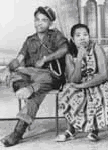
Max and Thabita Tauran (Picture: oorlogsgetuigen.nl)
After the war my father became a policeman on Ambon. I was thirteen years and at last I could return to school. My father managed that after I finished secundary school I als could join the police force. Consequently in 1953 I started as a policeman fourth class on New-Guinea. Later on I was transferred to the mobile brigade on the island of Sorong-doom.
In 1962 I was away from home for a couple of days, on patrol. When I returned my wife vrouw Nonja and our seven children were already sent to Holland. The New-Guinea-treaty was signed, the sovereignty was transferred to Indonesia. Then I came with a large group of civil servants also to Holland. TO me the reunion with my family was a liberty day.
Two days after the capitulation of Japan Indonesia declared its independence. 17 August is bad day for me. Initially it seemed Soekarno freed country and people from the colonial oppression. But soon we found out that in this unity there was no room for our own Moluccan culture. The RMS wanted that room. I'm a Moluccan, but I'm also a loyal servant to the Kingdom of the Netherlands. Thanks to former KNIL-ers, the Dutch who stayed behind in Indonesia, could safely return home. But the Dutch government is doing very little for us. Holland has made peace with Indonesia, but completely ignored the value of our people. The Moluccans feel alone in their friendship. When I hear news about my country nowadays, my heart is torn.
I'm the chairman of the Dutch village society Kamarían. For my village of birth we've started a drinking-water project. But I'm also naturalized as a Dutchman and integrated in society. I often stand between two fires.
On every RMS-day I fly the flag. Ofcourse on 25 April, the date on which in 1950 the RMS was proclaimed. On 12 April, the date that in 1966 our RMS-president Chris Somoukil was executed by Indonesia. And on 27 December, the day the Netherlands handed over the souvereignty to Indonesië in 1949. In this way I want to remember the Dutch gouvernment and the Dutch people to the agreements that were made at that time for a United Indonesian Republic, with a seperate aparte status for the Moluccas.”
Dineke Stam
Source: www.oorlogsgetuigen.nl
Witness Jacob Litamahuputty
KNIL-soldier, soldier second class artillery Inheemse Militie (Native Militia)
Jacob was born around 1918 on Saparoea (one of the Lease-Islands, S.E. of Ambon) in the village Itawaka. His christian parents were Domingus Litamahaoputty and Johanna Matatula. He was the eight child and joined the KNIL at a very young age. On 31 January 1942 the Japanese attacked Ambon with superior numbers and heavy bombardments. They wanted a base for the attack on Darwinland, Australia. The fortress-garrison, waiting for American help, stood powerless. Litamahputty survived and was able to return to Saparoea. With company-members he started a resistance group.
The group gathered information on the Japanese troups and prepared to assist an allied landing in the Moluccas. Early 1943 the group committed some sabotage actions on offices and depots. They killed a number of Japanese soldiers. The Japanese occupier hunted Jacob down, leader of the guerillagroup. By heavy punishment for every kind of resistance they managed to isolate him from the rest of the island occupants. When they threatened to detain his father and sister until he turned himself in, Jacob surrendered (14 August 1943).
First, with the remaining rest of the group, he was imprisoned in Saparoea-town and then in Amboina. After torture, Jacob Litamahuputty together with 25 others, was executed on 2 March 1944. Never a statue was erected for him.
Miriam van Colijn
Source: 'Goed voor een lintje', in Contrast 22/23 (3 July 2003)
Hans Ursepuny, Multiple Choice
Surinam
Witness Theophilia D'Hondt-Berkenveld
Because of the Second World War, Theophilia D'Hondt-Berkenveld (1916) was able to spread her wings and leave Surinam. When she remembers the war, she remembers a nice period in her life.

Picture: www.oorlogsgetuigen.nl
“I was 24 when the war started. At that moment I was a school teacher, but I didn't have a permanent job. My father didn't like it at all. He wanted me to work and brought me to the nuns who taught me stenography and typing. My sister found an advert from the navy, which asked for a secretary. When the war started all men had to join the army and the offices where short of staff, so they took girls and women in. I could start immediately.
It was responsible work. My boss was the chief of intelligence and censorship. I learned the navy-codes and transferred the messages from the telex to notes for my chef. One day there came a letter which said that one of the Dutch refugees who came to Surinam, had to take may place. A 'brownie' with such a responsibility had to be replaced ofcourse. My chef took my part, because he didn't want to lose me. I knew all the codes and he was satisfied with my work.

Foto: www.oorlogsgetuigen.nl
When they managed in Europe to control Hitler, Surinam boys and girls were recruited to free the Indies. My sister and I came forward to join the City and Country Force, the Surinams women's army connected to the KNIL. I was appointed a sergeant to escort a group of seventeen girls to Australia. Imagine: the trip through the US was in a long train with only military and somewhere in the middle the wagon with my girls. I had to see to it they didn't end up pregnant in Australia.
When I still was in Surinam, I met a nice Dutch military. He wanted us to get married, but I refused. 'Oh no', I said to him, 'I've seen that too many times. I'll get stuffed with children and stay here while you leave... I also wanted to leave Surinam.' We kept on writing each other. Much later, in the Indies, we met again. He asked me by mail if I wanted to marry him in Batavia. Our commanders arranged for it. We stayed in Indonesia until Soekarno threw us out. With our first two children we came to stay in Holland.
With the Women's Army we remember the war every year. At a memorial place in Bronbeek we lay a wreath, and also on the 4th of May on the Dam (Amsterdam).
We bring back stories from the past. Some of us have terrible stories. I actually had quite a nice time in the army. I've seen America, Australia, Indonesia. Dancing evenings were organised to entertain the boys, and we were invited so they had girls to dance with. And the most beautiful day of my life - the day I married - was in war time.”
Mieke de Waal
Source: www.oorlogsgetuigen.nl
Turkey
Haci Karacaer about commemorating

Picture: Pim Ligtvoet
We must share the stories from our past
The fourth of May never meant a thing to me. I mean, it didn't come on its own. It wasn't something from me, I was kept out. The fourth of May was from the Dutch and on the fifth of May tolerated because 'multicultural' was the legacy of the fourth of May, from the Second World War. Never again war, never again racism, that sort of things.
The fourth of May never meant a thing to me. I mean, I never figured out how you can remember the countless victoms of one criminal man in one line with the soldiers you sent to death yourself in the aftermath of your colonialism.
The fourth of May never meant a thing to me. I mean, until I talked with a neighbour from level three who put some tulips at the tiny monument at the Riva-garage. It was for her brother and for the girl nextdoor who both didn't return. Then the fourth of May meant something to me.
What should the fourth of May tell me?
Our education is backdated. Sixty percent of our youth has no grandparents who were in the Second World War. Or at a different way. In the luggage of Turkish youngsters the battle for Gallipoli from 1915 is etched in their memory. Hundredthousands of Turkish civilians and soldiers were slaughtered in a battle fought between the English and Germans on Turkish soil. Who lifted a finger for us? And when there was no room for Armeniens in the making of nowadays modern Turkey: who lifted a finger for them?
More reading / Sources
National Bureau against Racism (LBR) - Lecture 3 May 2003, Laurenschurch Rotterdam www.lbr.nl
www.kindermonument.nl
Remembrance 15 August 1945 Foundation
www.verzet.org
Resistance Museum Amsterdam
Friars of Huijbergen, Friar Angelus van der Zanden

Please do feel free to comment on our English translation. We welcome any improvement!
|